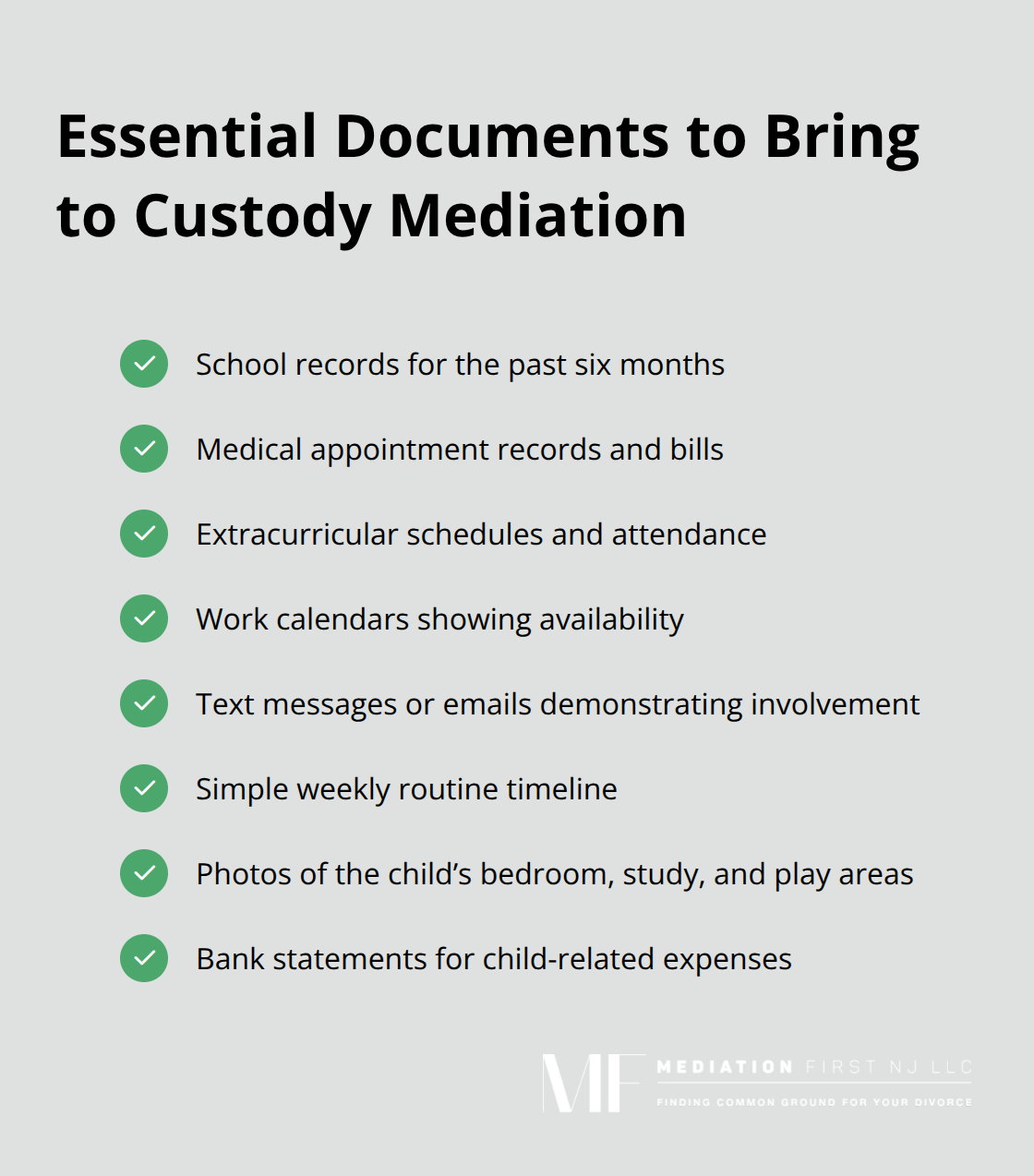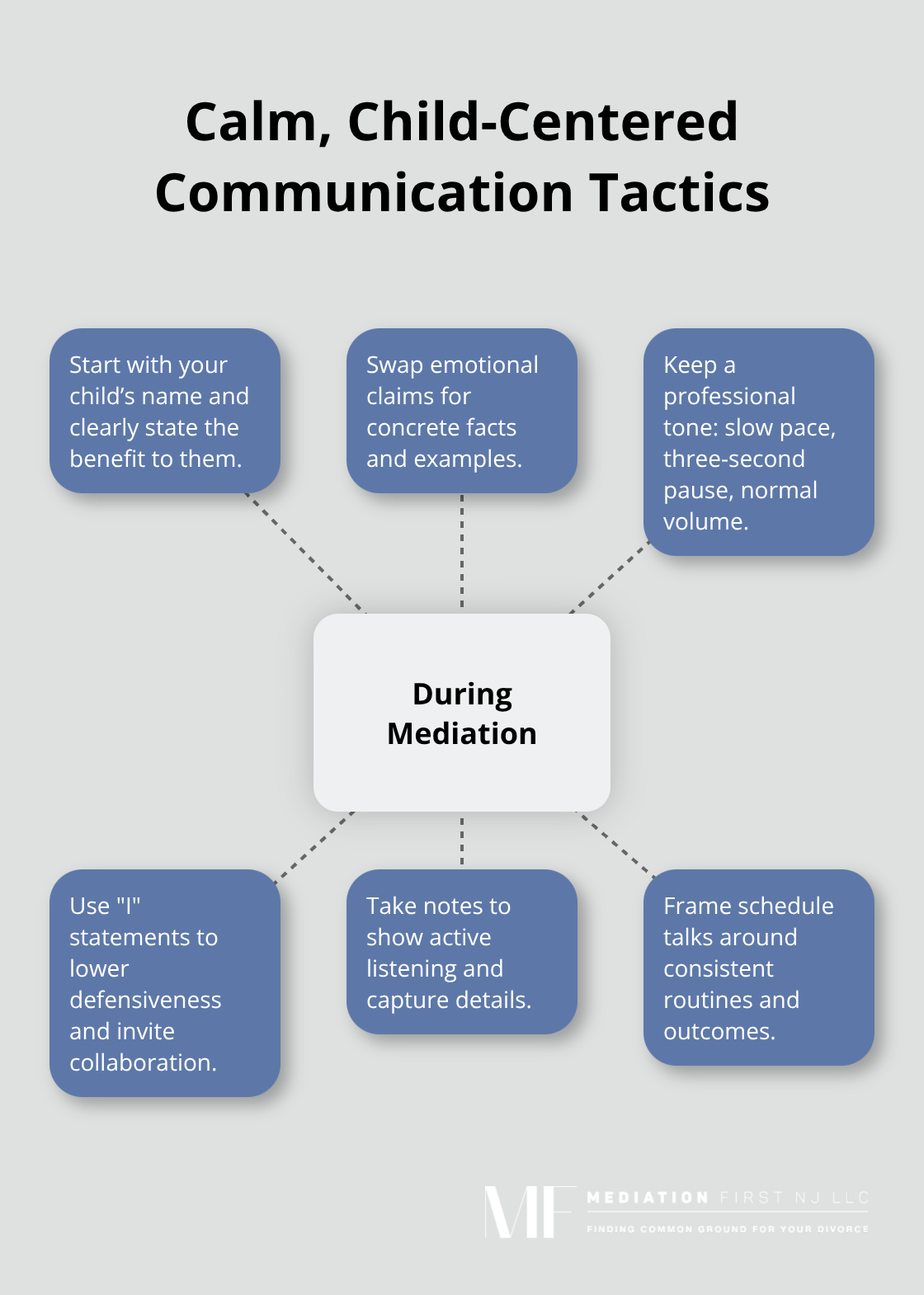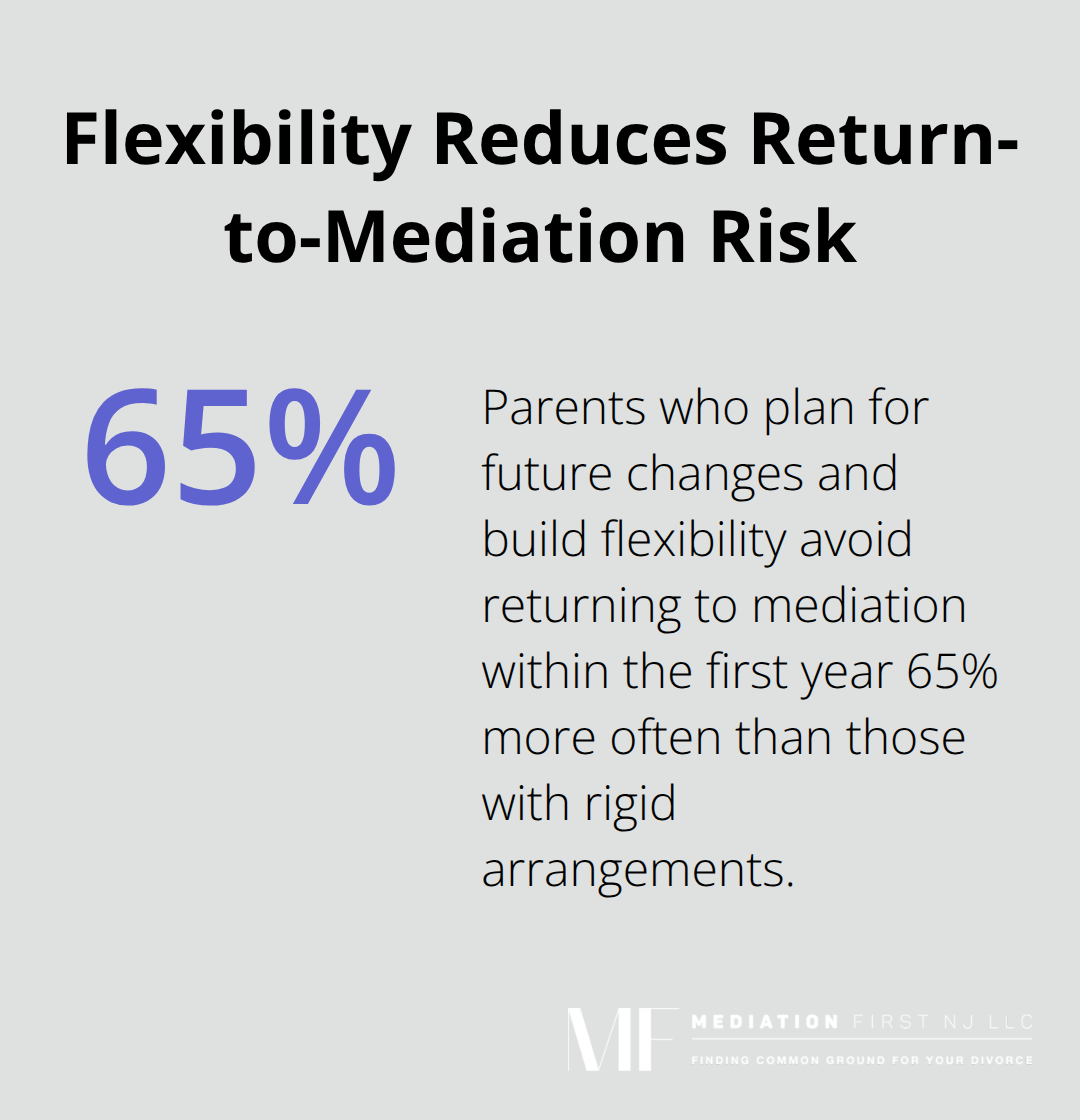Custody mediation can feel overwhelming when you’re unsure what to say in custody mediation sessions. The right words can make the difference between reaching a fair agreement and facing prolonged conflict.
We at Mediation First NJ LLC have guided countless parents through successful mediation conversations. This guide provides the exact phrases and strategies that work.
How Should You Prepare Your Message Before Mediation
Success in custody mediation starts weeks before you enter the room. While mediation typically has high success rates, your preparation determines whether you’ll communicate effectively or stumble through important discussions about your child’s future.
Identify Your Non-Negotiable Items
Start with three specific items you absolutely cannot compromise on. These might include your child’s current school attendance, weekend soccer practice participation, or consistent bedtime routines. Research shows that parents who identify their core priorities beforehand achieve better outcomes compared to unprepared parents.
Write these priorities in simple, child-focused language. Instead of stating you need every weekend, explain that your child thrives with consistent Saturday morning activities that you’ve shared for two years. Document why each priority matters for your child’s wellbeing with specific examples and dates.
Collect Your Supporting Documents
Gather school records, medical appointments, extracurricular schedules, and work calendars from the past six months. Include text messages or emails that show your active involvement in your child’s daily life. Parents who bring organized documentation typically settle cases faster.

Create a simple timeline that shows your child’s weekly routine (including pickup times, activities, and responsibilities you currently handle). Take photos of your child’s bedroom, study area, and play spaces at your home. Print bank statements that show expenses you cover for your child’s needs. This concrete evidence speaks louder than emotional appeals and helps the mediator understand your current involvement level.
Practice Your Key Messages
Practice how you explain your position in two minutes or less with specific facts rather than general statements. Record yourself or practice with a trusted friend who can point out when you sound defensive or angry. Focus on your child’s needs rather than your rights as a parent.
Replace phrases like “I deserve” or “I want” with “my child benefits from” or “my child needs.” Parents who practice their communication typically reduce mediation time significantly. Write down three questions you want answered and practice how you ask them calmly (prepare responses to likely challenges from the other parent without becoming defensive or argumentative).
These preparation steps set the foundation for productive conversations about specific custody arrangements and schedules.
How Should You Speak During Mediation Sessions
Your words during mediation sessions directly impact whether you reach an agreement or face additional court hearings. Parents who focus conversations on their child’s specific needs rather than their own frustrations create more productive discussions during family mediation.
Start Every Statement With Your Child’s Name
Begin each proposal with your child’s name and explain how it benefits them specifically. Instead of saying you want more time, explain how Tuesday evening homework help has improved your child’s math grades from C to B over the past semester. This approach shifts focus from parental rights to child welfare and creates more productive discussions.
Replace Emotional Language With Concrete Facts
Transform emotional statements into child-centered observations about behavior and needs. When you discuss schedule changes, mention that your daughter sleeps better on school nights when she follows the same bedtime routine at both homes rather than stating the other parent lacks consistency. Document specific examples like your son’s improved soccer performance when he attends practice twice weekly versus once monthly (parents who present factual observations rather than accusations receive more cooperation from the other parent and achieve better mediation outcomes).
Maintain Professional Communication Under Pressure
Speak slowly and pause for three seconds before you respond to challenging statements from the other parent. This technique prevents reactive responses that derail productive conversations. Keep your voice at normal conversation level even when you discuss difficult topics like missed visitation or late child support payments. Write down key points while the other parent speaks to show you listen actively and to prevent forgetting important details.

Use “I” Statements to Reduce Defensiveness
Frame your concerns with “I” statements that focus on your child’s needs rather than the other parent’s shortcomings. Say “I notice Emma struggles with transitions between homes” instead of “You never prepare Emma properly.” This communication style reduces defensiveness and opens pathways for collaborative solutions (parents who master this technique report higher satisfaction with final agreements and smoother implementation of custody arrangements).
These communication strategies prepare you to address specific topics that commonly arise in custody mediation sessions.
What Topics Will Come Up in Your Mediation
Schedule Proposals That Create Stability
Present your parenting time proposals with specific days and times rather than vague requests for more time. State that your child benefits from Wednesday overnight stays because you help with Thursday morning science projects that improved her grades from D to B this semester. Include pickup and drop-off locations that minimize travel time for your child.
Parents who propose detailed schedules with concrete reasoning can reach agreements through mediation where they feel committed to follow through. Address holidays with alternating patterns that account for extended family traditions your child enjoys. Mention specific activities like Sunday morning soccer practice or Tuesday piano lessons that require consistent transportation. Document how current arrangements affect your child’s sleep patterns, school performance, or social connections.
Financial Discussions Without Drama
Frame child support conversations around your child’s documented expenses rather than your financial hardships. Present school tuition receipts, medical bills, and extracurricular costs from the past six months to show actual spending patterns. Custodial parents who received payments were more likely to be mothers, so specify additional expenses you handle.
Discuss how you split costs for school supplies, clothing, and activities with concrete dollar amounts. Address future expenses like braces, tutoring, or summer camps with estimated costs and payment schedules (parents who prepare expense documentation typically resolve financial disputes within two sessions compared to multiple meetings for unprepared parties).
Future Changes and Flexibility
Address potential relocations with explanations of how you maintain your child’s relationships with both parents and extended family. Propose communication methods like video calls or extended summer visits that preserve important connections. Discuss job changes that might affect your schedule with flexible arrangements that adapt to new work hours.
Include provisions for your child’s changing needs as they grow older and develop new interests or activities. Address remarriage situations with explanations of how new family members will support rather than replace existing parental relationships.

Parents who anticipate future changes and build flexibility into their agreements avoid returning to mediation within the first year 65% more often than those with rigid arrangements (this proactive approach saves both time and additional mediation costs).
Final Thoughts
Parents who master what to say in custody mediation create productive conversations that benefit their children. Those who prepare key messages, focus on child-centered language, and present concrete facts achieve better outcomes in less time. Mediation resolves cases within 2-4 sessions compared to court battles that stretch 12-18 months.
Parents save thousands in legal fees while they maintain control over their family’s future rather than leave decisions to a judge. The mediator drafts a comprehensive parenting plan that becomes legally binding once filed with the court. This document serves as your roadmap for successful co-parenting and reduces future conflicts (it addresses common scenarios before they arise).
We at Mediation First NJ LLC help New Jersey families navigate these important conversations with professional guidance. Our collaborative approach creates agreements that work for your unique family situation. We build the foundation for positive co-parenting relationships that last for years.

